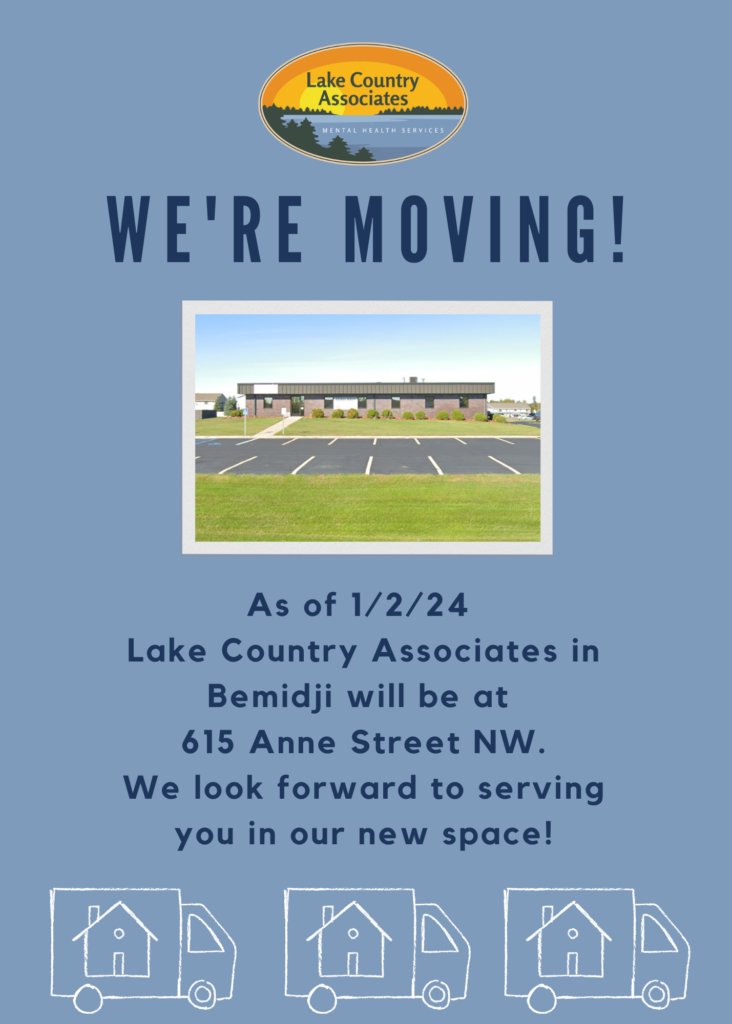Ways to Communicate in Marriage – Step 1
LCA News and Information

By Diane Cerven, LPCC
In couples therapy the number one rule I have is for each person to speak, ‘one at a time’. When we’re able to say everything, we feel connected. Of course, how it’s said is very important but let’s focus on going ‘one at a time’ first.
It’s a lot harder to speak one at a time. We’re used to saying things right away, even talking over each other. We’re also used to thinking of what we’re going to say while the other person is talking and not listening.
It’s miscommunication when communication goes quickly. We may hear one part, perhaps a fact that isn’t correct, or a misunderstanding our spouse had. We can get defensive and have a justification ready to say. Conversations can easily become escalated, frustrating, and leave us feeling unheard. Or if they reach a place of hearing it takes longer because of having to get through all the interruptions.
When I say, ‘one at a time’, I mean that we let our spouse talk without interruption and with our full attention. Don’t let internal dialogue, problems, and thoughts get in the way of your attention. When our focus and goal is to listen to their point of view, we’re able to have better communication.
‘One at a time’ is a small change that will make a huge impact. Hear everything your spouse wants to say before you share your side. Then it’s your turn to share.
This slower back and forth helps to stop arguments. You’re trying to understand them, then they are trying to understand you. It’s a first step towards better communication.
Try it this week and see. As we discussed last week, there are several ingredients to get to good communication but this one will help get the ball rolling.
What’s the Next Step?
Follow us on Facebook to see when the next blog is posted, or check back here.
I do couples counseling online if you need help communicating or with other relationship needs. To schedule a counseling appointment, call us at 218-366-9229 (Park Rapids) or 218-444-2233 (Bemidji). For those interested, I offer Christian counseling online. Please let our office support staff (and me) know that you are interested in Christian counseling. Learn more about LCA clinical staff here.
Blessings,
Diane Cerven, LPCC
Missed reading about using distraction skills as a coping skill, read more here:
Want to know about Mental Grounding Skills
How to Communicate in a Relationship
LCA News and Information
By Diane Cerven, LPCC

Communicating in marriage and relationships can be one of the most difficult things to do. This is because more feelings are involved, and more is at stake as far as the quality of our lives are concerned.
In many ways communication can be like making a recipe. Let me tell you the ingredients that are needed and then we’ll learn how to put them together. This will help improve communication between you and your spouse.
Recipe for communication skills:
- Be a good listener.
- Put aside judgements of how your spouse felt.
- Don’t find the hidden meaning in what they are saying.
- Don’t take offense.
- Ask questions.
- Be curious about their world; what they felt, saw, understood, and thought about an event.
- Reflect on what you heard them say.
- Empathize with them, (which does not mean you agree.)
- Let them talk about their side before you share your side.
- Use ‘I statements’ when it’s your turn to speak.
- Don’t criticize them, name call, tell them what is wrong with them, label them, or accuse them.
- Be gracious, give them the benefit of the doubt.
- Remember they’re your loved one, not your enemy.
- Speak with kindness, patience, and love.
- When it’s your time to speak, have the goal that you want to be heard and understood.
- Have the right tone of voice; calm and soft.
- When overwhelmed take a ‘time out’ to self-sooth during the conversation. Don’t let your emotions take control.

Listening
Now that you have the ingredients let’s start looking at them deeper, beginning with listening.
Listening can be one of the hardest parts of communication. Sitting patiently, hearing what our spouse has to say, understanding their point of view, and not becoming offended can be hard. However, it’s the most important if you want to figure out what they’re upset about. This is where having the right goal for your conversation will help.
Bad goals include:
- Wanting to be heard. Remember, you’re the listener at this point. You’ll get your chance to speak during your turn, but first you need to know what they’re upset about. Put your side to the side while it’s time for you to listen.
- Assuming you know what they’re going to say. Even if your assumption was correct, you should still be listening to them.
- Finding fault in their recollection of the events and then arguing about what happened 1st ,2nd, 3rd, etc…. I call this arguing the facts.
Good goals:
- Understanding your spouse. What is it they felt, thought, understood, even misunderstood about what was said and done.
- Getting into their world. This is the “walk a mile in their shoes” metaphor at work.
- Allowing them to be heard. We all want to be heard, now it’s their turn.
- Breaking thru a problem, even if it’s just for understanding. Communicating and feeling heard are so important in keeping a relationship connected.
Now that you have a good goal(s) remind yourself of it before you start a conversation. Perhaps write the goal in the notes of your phone. Keep a post-it note someplace visible as a reminder to yourself until it becomes a part of who you are and how you communicate. Learning skills are great but putting them into practice can be hard. That’s when reminders can be helpful. After a while you won’t need them but until then it’ll help you get better.
Join us next time as we talk more about communicating with your spouse.
What’s the Next Step?
Follow us on Facebook to see when the next blog is posted, or check back here.
If your marriage has big communication issues, then you may need more help. We’re here for you. I offer marriage counseling online. To schedule a counseling appointment, call us at 218-366-9229 (Park Rapids) or 218-444-2233 (Bemidji). For those interested, I also offer Christian counseling online. Please let reception staff (and me) know that you are interested in Christian counseling. Please check out our staff bios here.
Blessings,
Want to read past posts on distraction skills, follow them here:
20 Minute Distraction to Calm Yourself
Reframing Valentine’s Day
LCA News and Information

What comes to mind when you think of Valentine’s Day? Is the stereotypical pink hearts, chocolate, red roses, and public declarations of romantic love all over social media? For the longest time, that’s all I thought of when I thought of this holiday. This is why I am not surprised when I hear that, for many, Valentine’s Day is one of their least favorite holidays. Valentine’s day can take an emotional toll for many who are not currently in a relationship, just broke off a relationship, are mourning the loss of a loved one, or are feeling alone. Valentine’s day can be a constant reminder of what we don’t have, what we wish we had, or what we lost.
So although Valentine’s Day is pictured as this fun and joyful holiday, research suggests that the focus on romantic relationships can trigger worsening symptoms of depression and anxiety. Statistically, suicide rates begin to increase during this time of the year, and many accredit this holiday for this phenomenon. (Suicide increase on Valentine’s Day)
We must begin reframing what Valentine’s Day is and how we can celebrate it and maintain our mental health. Romantic love is only one face of love. If Valentine’s Day is a day to be celebrated, let us celebrate love in its entirety. If the highlight of this holiday is love, let’s celebrate love in all its forms and humans’ capacity to love one another as well as ourselves.
Here are some ideas to celebrate this Valentine’s Day regardless of the stage of life one is in:
- Love your body: Show love to your body, whether through self-care such as face masks, pedicures, and a massage or conscious body movement and exercise. Love your body from the inside out by nourishing it with healthy food or treating yourself to your favorite restaurant. Take care of the body you have, and appreciate all of the wonders it’s done for you so far.
- Love your mind: Stay away from social media. Disconnect from social media for the day and spend time with yourself or loved ones instead. According to a study by (Lambert et al., 2022 ), disconnecting from social media for just one week can greatly impact your mental health and help alleviate symptoms of depression and anxiety. Take this time to focus on yourself and focus on all of the things you love about yourself. Acknowledge your emotions and feelings and know that they are valid. Take time out of your day to journal or reflect on your day.
- Love others: Plan a date night with all of your favorite people, whether it’s out in your favorite restaurant or right at home. Call a friend just to talk or send a funny meme to a friend. Connecting with others is essential and helps to create a sense of community. There are people in this world that recharge you and spark joy in your soul! Seek them out
Paula O’Campo is a Licensed Professional Counselor at Lake Country Associates in Park Rapids, MN.
If you are experiencing symptoms of depression and anxiety during this time of the year and would like to meet with a therapist, call Lake Country Associates at 218-366-9229 or send us a note. To access the Minnesota Crisis Text Line, text MN to 741741. To call the mobile crisis team, call 1-800-422-0045. If you are experiencing a mental health emergency, please visit your local hospital or call 911 right away.
References:
Benefits of taking a break from social media:
Lambert, J., Barnstable, G., Minter, E., Cooper, J., & McEwan, D. (2022). Taking a One-Week Break from Social Media Improves Well-Being, Depression, and Anxiety: A Randomized Controlled Trial. Cyberpsychology, behavior and social networking, 25(5), 287–293. https://doi.org/10.1089/cyber.2021.0324
Impact of Valentines Day on Mental Health:
Surviving the Long Minnesota Winter
LCA News and Information
By Paula O’Campo, MSW, LPC
There’s winter, and then there are Minnesota winters. Winters that can be oh so cold and hard on the soul. With little sunlight and fewer opportunities to go outside and be active, it can be easy to overlook our mental health. Seasonal depression is common in the northern part of the United States, where sunlight is scarce, and winter weather hits especially hard.

So how will we survive this seemingly never-ending winter?
1. Get Some Sun!
Humans depend on the sun to regulate our moods, sleep cycles, and other essential mental and bodily functions. Sunlight also supplies us with vitamin D that we absorb through our skin to regulate our mood and sleep (Boulkrane et al., 2020). This is one of the reasons that taking a Vitamin D supplement is essential for many of us Minnesotans in the winter. Vitamin D deficiency is common in states that typically have a dark winter and can exasperate depression symptoms. One must first consult with their doctor or general practitioner before beginning any new vitamins or medications. Sunlight can be an excellent alternative to helping mood and overall sleep cycles (Postolache & Oren, 2005). Light therapy in the form of sun lamps can be an excellent alternative to mimicking the benefits of the sun. Sun lamps can help mood and balance sleep cycles by sitting in front of a sun lamp in the morning for anywhere from 15 – 20 minutes can make a big difference in helping us survive this hard winter.
Here’s an example of a Sun Lamp for light therapy.
2. Keep Your Body Moving
Besides maintaining an appropriate vitamin regimen, focusing on the body’s movement and keeping a consistent and effective daily schedule can do wonders to improve your mood. You don’t have to live at the gym to feel the positive effects that daily and consistent movement can have on the body (Carek et al., 2011). Whether it is a short daily walk outside, snowshoeing, or walking on the treadmill or stationary bike at home or the gym. Any movement can help the body begin to feel energized and awake. Keeping a consistent routine and schedule for your day can help lessen the difference in weather from summer to winter and help one process the change in seasons easier.
3. Build Community and Strengthen Connections
Taking the time to maintain and build connections and community with others helps us to get out of our bubbles and interact with others. We are meant to be social creatures with community and support. Winter is always easier when you don’t feel you are facing this alone.
4. Embracing and Reframing Winter
Although Minnesota winters can be long and hard, much beauty can be found during this season. Embracing the winter and enjoying this season can look different for many in our area. For some, embracing winter can look like taking on a new winter sport like snowboarding, snowshoeing, or skiing. For some, it can look like joining a new book club, learning to knit, or learning a new recipe. Winter is not just meant to be survived but experienced and lived through. Winter can be a great teacher. It can be a time for slowing down and learning to rest our minds and body. Like all of the seasons of life, winter is a season that is not meant to last forever. Just like winter has its time, spring will also come and join us in its time.
Paula O’Campo is a Licensed Professional Counselor at Lake Country Associates in Park Rapids, MN.
If you are experiencing symptoms of seasonal depression and would like to meet with a therapist, call Lake Country Associates at 218-366-9229 or send us a note. To access the Minnesota Crisis Text Line, text MN to 741741. To call the mobile crisis team, call 1-800-422-0045. If you are experiencing a mental health emergency, please visit your local hospital or call 911 right away.
References:
Benefits of Vitamin D:
Boulkrane, M. S., Fedotova, J., Kolodyaznaya, V., Micale, V., Drago, F., van den Tol, A. J. M., & Baranenko, D. (2020). Vitamin D and Depression in Women: A Mini-review. Current neuropharmacology, 18(4), 288–300. https://doi.org/10.2174/1570159X17666191108111120
Benefits of Sun lamp and light therapy for seasonal depression:
Postolache, T. T., & Oren, D. A. (2005). Circadian phase shifting, alerting, and antidepressant effects of bright light treatment. Clinics in sports medicine, 24(2), 381–xii. https://doi.org/10.1016/j.csm.2004.12.005
Benefits of Exercise on Anxiety and Depression:
Carek, P. J., Laibstain, S. E., & Carek, S. M. (2011). Exercise for the treatment of depression and anxiety. International journal of psychiatry in medicine, 41(1), 15–28. https://doi.org/10.2190/PM.41.1.c
LCA Hiring Mental Health Practitioner or Certified Peer Specialist in Park Rapids and Bemidji
LCA News and Information
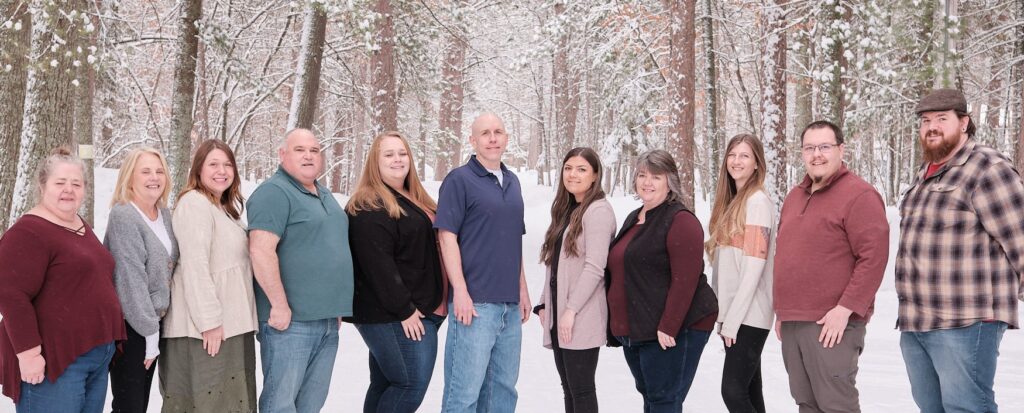
Lake Country Associates is seeking a full-time or part-time Mental Health Practitioner or Certified Peer Specialist for its Park Rapids and Bemidji ARMHS Programs. A Mental Health Practitioner provides a variety of rehabilitation services and skills training to clients experiencing serious and persistent mental illness. These services are based in the community, are flexible and are scheduled around the staff and client’s availability. Mental Health Practitioners work in coordination with a Mental Health Professional and county case managers to teach rehabilitative skills needed to avoid hospitalization and maintain people’s independence in the community.
If you’re interested in a rewarding and flexible job helping others, please send your resume to [email protected] or call us at 218-366-9229.
LCA Welcomes Ann Dietman MSW, LGSW
LCA News and Information
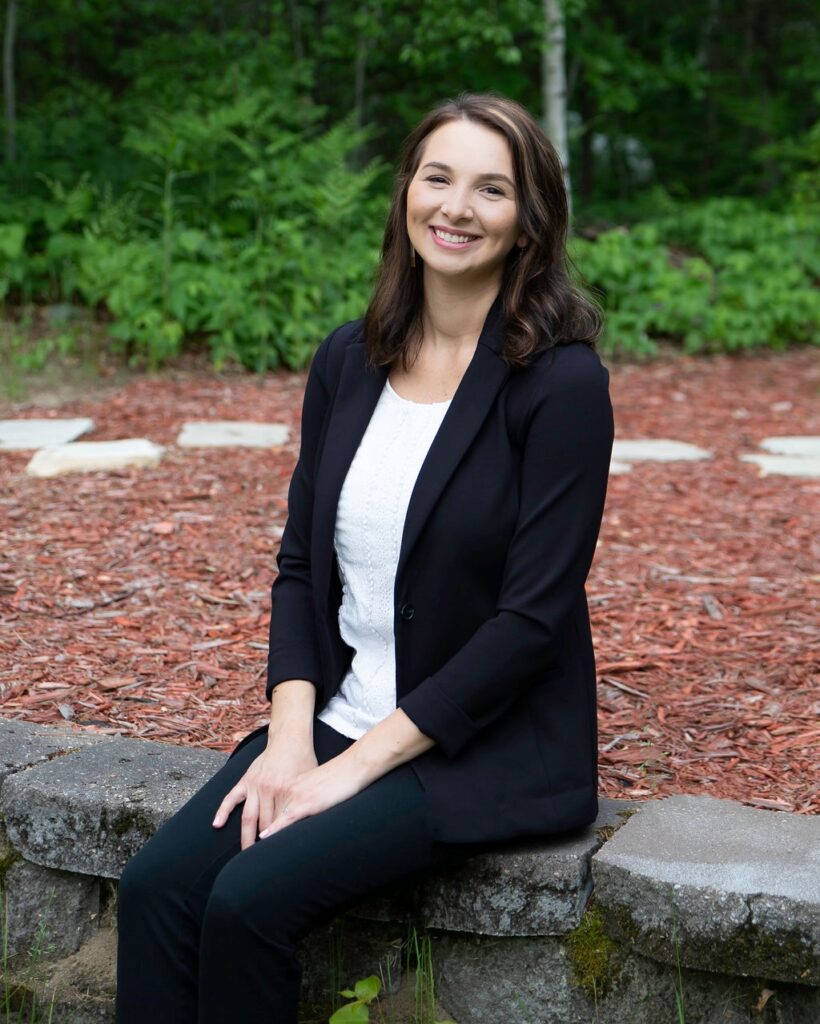
Lake Country Associates’ Bemidji office is happy to announce the addition of Ann Dietman, MSW, LGSW to our team of professionals. Ann is a mental health professional specializing in early childhood mental health. She received a Bachelor’s Degree in Child Development from Concordia University, St. Paul, and holds a Masters Degree in Social Work from Walden University. Ann is a licensed graduate of social work through the Minnesota Board of Social Work.
Ann has 15 years of experience working with children, families, and educators. She is a trainer in adverse childhood experiences (ACES), as well as trauma responsive care for infants and toddlers. In promotion of developmental approaches to children, she provides consultation and reflective practices to early childhood professionals, families, and programs. Ann enjoys holding educational and support groups with parents and expectant families. She believes in therapeutic approaches to play and enjoys working to foster children’s developmental growth with a strengths-based perspective. Ann is trained in conducting Early Childhood Mental Health Assessments for ages 0-5.
For more information or to schedule an appointment with Ann Dietman, call Lake Country Associates at 218-444-2233.
How Chicken Noodle Soup Improves Mood
LCA News and Information
By Kara Lawhorn
Before describing exactly how chicken noodle soup can improve your mood, take a moment to think how the weather has fluctuated rather frequently over the last few weeks and how it made you feel. One moment the sun is out and shining, the next, ANOTHER snow storm, yuck! Winter has seemed to last an eternity this year and it can be difficult to boost any level of positivity when the weather turns for the worst. However, there is hope! The good news is we are all aware of seasonal change here in Minnesota and while some winters are less harsh, we are always prepared for them. Let’s look at how exactly chicken noodle soup can improve our moods.

Creamy Chicken Soup Recipe
½ cup of butter 1 TSP sugar
7 large ribs/stalks of celery- washed and finely chopped 2 TSP onion powder
5 large carrots- washed and finely chopped 1 Bay Leaf
1 TBLS of minced garlic OR 1 large garlic clove- minced
2/3 cup flour 2 TSP Garlic powder
2 TSP dried basil leaves 2 cups heavy whipping cream
1 small-to-medium onion chopped 2 TSP salt
3 cups chicken broth 2/8 TSP pepper
1 cup whole milk 2 TSP thyme
2-3 large chicken breasts OR 1.5 LB chicken tenderloins (boneless/skinless)
*Place all ingredients in crock pot and leave in refrigerator overnight. In the morning, set the crockpot on low for 8 hours.
Serotonin
You may be asking yourself why you are looking at a recipe for chicken soup. As the weather continues to change and there may be further snow storms or rain, it is easy for many of us to stay hunkered down indoors versus being outside where currently the temperatures are ranging from 20 to 45 degrees. While staying indoors is not bad for your health, not doing things to ignite your serotonin can be a challenge to it. The serotonin hormone is typically linked with our moods. Although, scientists can not exactly pinpoint if we can become depressed because of low serotonin levels or our serotonin levels are low because we are depressed, the link still exists.
Serotonin is a neurotransmitter, which is a fancy word for messenger. Neurotransmitters send hormone chemicals through our blood stream and nervous system, which is like sending messages to other parts of our body. It can impact our sleeping, eating, and digestive patterns. Some of the best ways to ensure a healthy level of serotonin are: light therapy, exercise, diet, and supplements. Diet according to merriam-webster are food and drink that are consumed. Included in our diets is tryptophan, tryptophan is an amino acid used for production and maintenance of neurotransmitters, or serotonin. High levels of tryptophan are natural boosters for serotonin. tryptophan can be found in high protein foods such as, you guessed it, chicken.
Other links to physical wellness that chicken soup has, include immunity boosts, length of duration, hydrating, taste bud enhancement, and congestion relief. Research supports that the vitamins found in chicken soup help support the immune system and decrease the duration of an illness. The broth from chicken soup is soothing as well as hydrating. Sore throats can be a common symptom of illnesses, and warm broth can help soothe the discomfort of a sore throat. The seasonings can help boost taste buds. Spices, in moderation, can help enhance taste buds that are dull from not feeling well. The steam from the soup can help with congestion. A stuffy nose can be pretty miserable, but the good news is that steam can help loosen mucus to make breathing easier.
Conclusion
While the weather can be discouraging, frustrating, and potentially gives us colds the good news is spring is here and the flowers and warmer temperatures are just around the corner. On the days that are just a little too dreary, make some chicken soup to boost your serotonin, or feel-good hormones. Take advantage of those sunny days and go for a walk, you are likely to hear the birds as they are out and ready for spring as much as everyone else is.
Resources
https://medicalxpress.com/news/2018-12-secret-chicken-soup-medical-magic.html
https://www.newswise.com/articles/just-how-healthy-is-chicken-noodle-soup
Bemidji ARMHS Team Welcomes Ashley Rohr
LCA News and Information
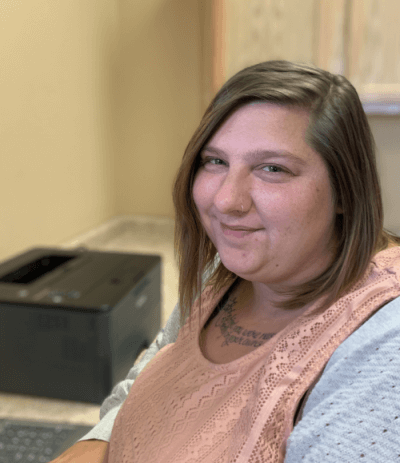
Lake Country Associates welcomes Ashley Rohr to our Bemidji Adult Rehabilitative Mental Health Services (ARMHS) team. Ashley recently moved to the area with her husband and two kids. She has over ten years of experience supporting adults with a variety of disabilities and mental health conditions. Having worked in residential and community settings, she has a passion for finding creative and constructive ways to help people manage their symptoms and focus on living their best lives.
One of Ashley’s passions is helping people get past the fear of stigma and judgement related to mental illness and helping people communicate their needs. She has experience working with people with physical disabilities, PTSD, chemical use and family trauma. In her free time, she enjoys reading, crocheting and spending time outdoors with her family. To make a referral to Ashley or for more information about our ARMHS program, call Lake Country Associates at 218-444-2233 or go to our ARMHS page. To make a referral to ARMHS, complete an ARMHS referral form and fax it to us at 218-237-2520.
Chris Ross Provides Mental Health Rehabilitation in Bemidji Area
LCA News and Information
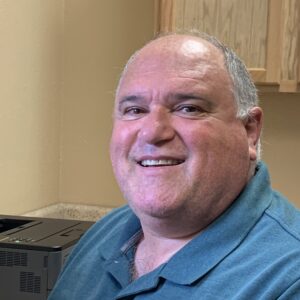 Chris Ross recently joined the Adult Rehabilitative Mental Health Services (ARMHS) team in Bemidji. He has spent the last 25 years supporting people in the Bemidji area. Chris received a Bachelor of Arts degree from St. Cloud State University in Psychology. He has spent most of his career working with children, teens and families in a wide variety of multi-cultural settings, on mental health and behavioral issues.
Chris Ross recently joined the Adult Rehabilitative Mental Health Services (ARMHS) team in Bemidji. He has spent the last 25 years supporting people in the Bemidji area. Chris received a Bachelor of Arts degree from St. Cloud State University in Psychology. He has spent most of his career working with children, teens and families in a wide variety of multi-cultural settings, on mental health and behavioral issues.
Chris Ross believes in building strong relationships with his clients and community organizations to provide the best possible outcomes for success with the people he supports. He looks forward to having an opportunity to work with you or your loved ones.
ARMHS is a program that provides mental health rehabilitation to people with mental health diagnoses including anxiety disorders, bipolar disorder, depression, major depression, schizophrenia, borderline personality disorder, and other serious mental illnesses. ARMHS Practitioners meet with people in their homes and communities and teach skills for managing the symptoms and challenges of mental illness. ARMHS services through Lake Country Associates do not require a diagnosis of Serious and Persistent Mental Illness (SPMI), but functional impairments the person is experiencing must be directly related to their mental health.
LCA Welcomes Drew Jaeger, MSW, LGSW
LCA News and Information

LCA’s Bemidji office welcomes Drew Jaeger, MSW, LGSW to their team of professionals. Drew Jaeger provides counseling services for adult individuals, adolescents (ages 14+), and couples. Drew believes in person-centered therapy that considers the whole person (mind, body, spirit) and uses strength-based, evidenced-informed strategies to partner with those whom he meets. Each person is considered an expert of their own experiences as client goals are pursued, together. Drew has experience working as a mental health professional since 2015 and in that time has enjoyed engaging clients through psychotherapy, adult rehabilitative mental health services, case management, and psychometric testing. Today, he commonly assists clients by helping to build coping skills, regulate emotions, overcome communication difficulties, and aid in relational dissatisfaction.
Drew is a Licensed Master Social Worker and holds a Master’s Degree in Social Work from the University of North Dakota. Drew has additionally earned two undergraduate degrees (Bachelor’s of Science in Psychology; Bachelor’s of Science in Social Work), along with a Minor in Religious Studies from the University of North Dakota. He serves client populations with a wide range of diagnoses and symptoms through evidence-based practices such as Cognitive Behavioral Therapy (including Dialectical Behavioral Therapy), Motivational Interviewing, Solution Focused Therapy, Narrative Therapy, and Enhanced Illness Management and Recovery.
He and his wife presently reside in Bemidji, MN. In his recreation time Drew enjoys exploring the outdoors (camping, hiking, biking, canoeing, skiing…you name it!) as well as engaging hobbies like leatherwork and knifemaking.
To make an appointment with Drew Jaeger call 218-444-2233 or visit our appointments page.
Isaiah Chalmers Joins Bemidji ARMHS Team
LCA News and Information
Lake Country Associates welcomes Isaiah Chalmers to the Bemidji team of professionals! Isaiah works as a Practitioner in the Adult Rehabilitative Mental Health Services (ARMHS) program. ARMHS is a community-based program that teaches people skills to manage their mental health symptoms while living in their homes and helps them avoid hospitalization.
Isaiah Chalmers to the Bemidji team of professionals! Isaiah works as a Practitioner in the Adult Rehabilitative Mental Health Services (ARMHS) program. ARMHS is a community-based program that teaches people skills to manage their mental health symptoms while living in their homes and helps them avoid hospitalization.
Isaiah is from Bemidji and is ecstatic to be back in the place that he calls home. He received Bachelor’s of Arts degrees at the University of Minnesota, Morris, where he studied to become culturally competent in helping relationships. Isaiah has background in working in adult foster care and assisted living, helping them foster independent lifestyles and make steps towards living on their own. He thoroughly believes and will strive to make mental health services available to all demographics and populations throughout his career. Isaiah is excited to work in the Bemidji ARMHS program and support the community he grew up in.
There is currently no waiting list for ARMHS services in our Bemidji program. To serve our community during the pandemic, services are currently offered either in-person or via telehealth, depending on the needs of the recipient. For more information or to make a referral, call us at 218-444-2233 or download a referral form, brochures and other information on our forms page.
Welcome to LCA Isaiah!
Worrying about the Future with Covid-19
LCA News and Information
By Diane Cerven, LPCC
I’ve heard many worries that the virus will be around for the next 1-2 years. We don’t know what the future holds and, because of that, we need to modify our thinking and not worry about tomorrow. I know this can be hard, especially for those that try to keep control in their lives but if you focus on the things that you have control over your worries will decrease and that will lead to a decrease in stress.
Create Your New Normal
Things could change again shortly, in which case you will adapt again, but with the information that you have today create your new normal. Organize, schedule, and plan for today with today’s information. Remember that we can take care of our needs, those around us, and still be ok.

Get the Help You Need as You Need it
There are many who have been able to get government help for their businesses/employees, unemployment, and from friends and neighbors. Keep looking for the help and asking for help. This is an unprecedented situation that we are all doing the best in. Do what you need to do for today.
Keep Yourself, Your Family and Others Safe
Some are wearing thin of the precautions and the shut downs. Do what you know to stay safe and keep other’s safe. Don’t worry about what other people are doing, take care of you and yours. It only adds unnecessary stress to get anxious, angry, or depressed about other people’s actions. Focus on you and do what you know is needed, that’s all that you’re in charge of.
Take One Day at a Time
You can manage today, just as you’ve managed in the past. Keep it simple, keep in your control what is in your control, and then let the rest go. When your mind tries to take off with the future or with other people, stop it, remind yourself of what you can take care of (ps that’s yourself and your immediate family like your children), and what you are doing. Everything else let it go.
There are many things that we don’t know. Worrying about what could happen will only strain us. It won’t stop the future or change it in anyway, other than the effects stress has on our own bodies. Go back to today, organize, plan, and take today’s worries only. In reality, you only have this moment, and you can handle this moment.
Do you need extra help?
If you feel that you need extra help because your anxiety feels too big, we’re here for you. Give us a call. We’re offering mostly online counseling at this time, with a few clinicians offering face to face. Call us at 218-366-9229, Park Rapids, or 218-444-2233, Bemidji.
Blessings,
https://lakecountryassociates.com/dealing-with-depression-during-covid-19/
A Guide to LCA Virtual Groups and Drop-in Hours
LCA News and Information
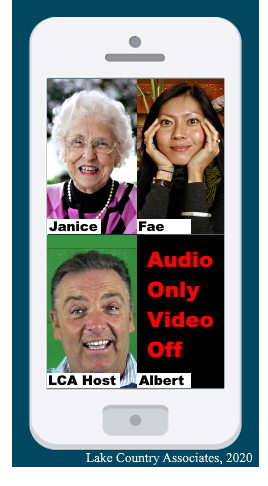
by RJ Wattenhofer
Whether you are a person who has attended LCA Cottage groups and drop-in hours in the past or are a first-timer, this guide will show you how to connect virtually through computer or phone so you can begin participating and expand your social support network.
Trying something new can be intimidating and so if you do not feel comfortable “jumping right in” you have the option of turning off your video and entering the Zoom room with a black screen (see picture) which will give you the opportunity to simply look around until you feel ready to participate.
The first step is to download and install the “Zoom Cloud Meetings” app. You can find this in your phone’s app store.
The second and final step is to find available days and times of groups and drop-in hours.
Click this link to view the LCA Calendar of Events: CALENDAR
Ready to get started? Click this link to join: https://zoom.us/j/4239727228
If you wish to attend with audio only (no option to turn on video) you can click this number to join via phone call: +13017158592 ,,4239727228# – listen for the code to auto-dial and the woman to finish speaking and then push # to join. If you do not own a smartphone then you will want to use the audio only feature. You will need to hand dial in both the phone number and access code.
NOTICE: All events are screened and carefully monitored to ensure confidentiality of participants and to eliminate potential external disruptions of services.
Dealing with Depression During COVID-19
LCA News and Information
By Diane Cerven, LPCC
Our entire world has changed as we hunker down during this pandemic in order to keep ourselves, our loved ones, and others safe. This change was unexpected and far-reaching. What we were doing a couple months ago and even last year at this time has been altered for safety. Changes in our environment affect our mental health.

What are some of the things that you can do to better your mental health? Here’s a list of important things to help alleviate depression symptoms.
- Talk with someone – During this crisis our normal routines have been completely disrupted. For some they are doing at home schooling, not going to work or social activities. Isolation is a symptom of depression that we need to combat. Are you taking the time to connect with important people in your life including family and friends? Zoom, messenger, facetime, and phone calls are all important for connection. Perhaps join online chat groups or communities to connect with others. There are many ways to connect, find them and make it a priority.
- Move – gyms and community centers are closed at this time but we can go outside. Find the time of day that works best for you and make it a priority. Getting into nature is another benefit that will help your depression. We all have been told how doing exercise alleviates depression symptoms this is still true during our quarantine. Find things that you like to do that will get you moving. You can also move in the house, YouTube has so many in home exercise videos you can choose from. (for other ideas or more information go to: https://lakecountryassociates.com/exercise-mental-health/ )
- Make a Plan for the Day – Lack of motivation to do things is another symptom of depression. To combat this schedule activities to get done. Get out of bed at a regular time and plan to accomplish even just one thing during the day. There are many things that need to be done in our homes, yards (maybe even do some planting), and sheds/garages. Tackle a project even if you don’t feel like it.
- Eat healthy – Many of us have chosen to eat more convenience food during this time. Make a change to healthy options. Our food choices affect how we feel because it’s the food that our body is running off of. At this time make small and healthy changes to your diet, or change back to your healthier options if you moved to unhealthy choices. This is an important point in our overall well being. (more information can be found here: https://lakecountryassociates.com/mental-health-and-healthy-eating/ )
There are many things that we can focus on to help us decrease our depression symptoms during this time. Of course you may need a professional counselor to help you even more. You are not alone as many have chosen to get extra help. Call our office if you would like to make an appointment at 218-366-9229 for Park Rapids or 218-444-2233 for Bemidji. We are doing telehealth counseling appointments at least through June 2020 or longer as is safest for our staff and clients. For more information on telehealth go here: https://lakecountryassociates.com/telehealth/
Let’s take care of ourselves and by taking care of ourselves we can take care of others. No matter what is going on around us, you are always a priority.
Many blessings,
LCA Welcomes Paula Ocampo, ARMHS Practitioner
LCA News and Information
 Lake Country Associates is happy to announce the newest member of our team in Park Rapids. Paula Ocampo has been working as a Mental Health Practitioner, providing Adult Rehabilitative Mental Health Services (ARMHS) services to people in the Park Rapids community. Paula’s is a Registered Behavior Therapist with over 3 years of experience providing behavior therapy to children, adolescents, and adults with various mental health diagnoses and various levels of independence. Paula is a Park Rapids High School graduate and obtained her Bachelor of Psychology at Concordia College in Moorhead, MN.
Lake Country Associates is happy to announce the newest member of our team in Park Rapids. Paula Ocampo has been working as a Mental Health Practitioner, providing Adult Rehabilitative Mental Health Services (ARMHS) services to people in the Park Rapids community. Paula’s is a Registered Behavior Therapist with over 3 years of experience providing behavior therapy to children, adolescents, and adults with various mental health diagnoses and various levels of independence. Paula is a Park Rapids High School graduate and obtained her Bachelor of Psychology at Concordia College in Moorhead, MN.
For the last 2 years, Paula has been working with children ages 2-6 years old diagnosed with Autism in Austin, Texas. She is now back in her home town working as an ARMHS Practitioner and is eager to be providing quality care to adults in her community. She is currently in graduate school studying Clinical Counseling and is looking forward to continuing to provide therapy to people in need in the Park Rapids area.
Welcome to LCA Paula!
Telehealth; An Important New Tool in our Mental and Physical Self Care Toolbox
LCA News and Information
By Kari Tomperi
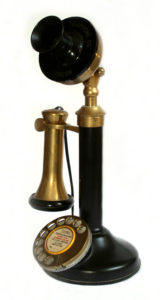
History tells how critical the invention of the “tele” graph was in keeping families, businesses, and governments informed and in communication with each other. Then the invention of the “tele” phone gave even more people access to communication with their neighbors and their doctors and business associates. Don’t forget the “tele” vision that allowed people to actually see other people while they were informed through the news or entertained through movies and weekly series. As computers and cell phones add a new “tele” to everything from “tele” medicine to “tele” education we need to remember it is just a tool that helps us communicate better.
Telehealth is different from telemedicine in that it refers to a broader scope of remote health care services than telemedicine. Telemedicine refers specifically to remote clinical services, while telehealth can refer to remote non-clinical services. Telehealth can focus on either our mental or physical health or both.
Wikipedia tells us “telehealth is the distribution of health-related services and information via electronic information and telecommunication technologies. It allows long-distance patient and clinician contact, care, advice, reminders, education, intervention, monitoring, and remote admissions. Telemedicine is sometimes used as a synonym, or is used in a more limited sense to describe remote clinical services, such as diagnosis and monitoring. When rural settings, lack of transport, a lack of mobility, decreased funding, or a lack of staff restrict access to care, telehealth may bridge the gap.”
With the current restrictions due to the CoVid-19 virus where we are asked to physical distance a minimum of 6 feet and to protect ourselves and others by wearing masks, our ability to talk to someone over a computer or phone screen is a chance to connect or communicate freely. We are lucky we are far enough into the virtual meeting space technology that this is a doable option. Businesses that provide these services are ever mindful of the need for privacy and carefully scrutinize how and when and who is a safe provider of telehealth services. Until we can meet face to face comfortably, it is a good second option or tool in our toolbox to access those services that make our lives better and more informed.
It is a personal choice how you can access services but in this “New Normal” we all need to be thinking and working together to find the best approaches for everyone. Just as you need to think of new ways to take care of you, your home and family in these trying times isn’t it nice to know there is an option that can protect them yet take care of everyone’s physical and mental health needs.
services but in this “New Normal” we all need to be thinking and working together to find the best approaches for everyone. Just as you need to think of new ways to take care of you, your home and family in these trying times isn’t it nice to know there is an option that can protect them yet take care of everyone’s physical and mental health needs.
Kari Tomperi is a mental health advocate and staff member of the Lake Country Cottage drop-in center in Park Rapids.
LCA Welcomes Melissa Saunders, Certified Peer Recovery Specialist
LCA News and Information
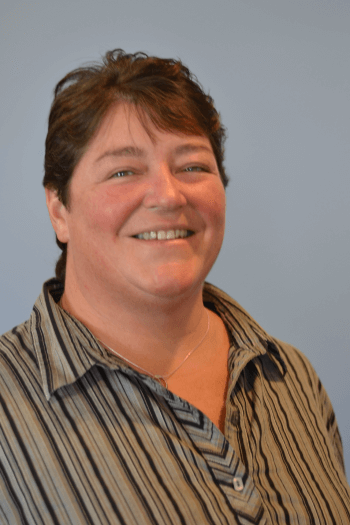
Lake Country Associates welcomes Melissa Saunders to the Substance Use Disorder (SUD) team in Park Rapids and Menahga. After graduating from an intense training program at the Minnesota Adult and Teen Challenge Program in Minneapolis and passing her exams at the Minnesota Certification Board, Melissa joins Lake Country Associates as our first ever Board Certified Peer Recovery Specialist (CPRS).
A CPRS is someone with lived experience in recovery who partners with people in need of additional support in their own recovery. The role of a CPRS is not the same as a sponsor. A CPRS focuses on being an advocate, a role model and a mentor. They work in partnership with mental health and substance abuse counselors and help people overcome barriers to recovery.
Melissa grew up in Hubbard County. She has one adult son and is an animal lover. She has been in recovery for over five years and is very passionate about the recovery journey. Melissa believes that with the proper tools, help with utilizing resources, and a healthy support system, recovery is possible. She believes in compassionate support, helping people break their goals down, and taking them on step by step.
More About Peer Recovery Services
For more information about CPRS services or any of LCA’s services for people with chemical dependency, call Lake Country Associates at 218-366-9229. You can also follow this link to LCA’s Substance Use Disorder program page.
Reducing Physical and Emotional Clutter
LCA News and Information
By Kelly Brevig

“Where does this go?” my husband asks as he stands in the doorway of our massive, catch-all closet. From the other room, I replied, “The second shelf down, right-hand side, just lower than my line of sight, in a pink basket.” I’m hoping he finds the right spot, or the storage space might avalanche. This closet is an epicenter of stress. One false move and we will be buried in half-done projects, seldom-used kitchen items, pictures, board games and every item that doesn’t yet have a home. Clutter, while supposedly the sign of a genius, can negatively impact our mental health by causing stress. Albert Einstein was known to have a messy desk. He was also intuitive, creative and a visionary. I am no “Einstein” by any means, yet I have often felt comfort in knowing that creative minds tend to have messy environments. Validated by this thought, our closet has now taken on a life of its own. This barely-contained chaos has got to go.
Dorothy Day once said, “Life itself is a haphazard, untidy, messy affair.” Life is messy; my house doesn’t have to be. In doing a bit of research, I’ve found that women disproportionately encounter higher levels of cortisol (the stress hormone) when their environment is disorderly. In contrast, people with cleaner homes experience greater physical health than their less organized friends. Clutter can interfere with pleasure and lead to procrastination. It can negatively impact our working memory and cause sleep deprivation. Fear of being discovered and judged a hoarder can cause embarrassment and even isolation. Hoarding itself is linked to obesity and binge eating. Mind-wandering, pleasure-killing clutter can stop us in our tracks and hijack our self-control. How do we get it back?
Letting Go of Clutter
Taking control of one’s life can be easier said than done, especially if depression and anxiety are involved. Often times we may have good intentions, but not sure exactly where to begin. I’ve recently been inspired by a series on Netflix titled, “Tidying Up” with Marie Kondo. Seeing other people learn how to organize and eliminate unused items has been inspiring. There are many resources on the Internet and within our community which can assist us in helping simplify and organize our lives. One of the things in common with the methods I’ve researched is to let go of items that are no longer used. It doesn’t matter if you donate, sell, or bring your items to a consignment shop, letting go of things can be validating and increase our generosity. Being generous creates feelings of self-satisfaction and bring happiness. Also, actually starting a project is necessary if it is going to ever get done. The mountain might be big, but it won’t move by itself. Don’t be afraid to start small and ask for help. Slow and steady wins the race.

Rome wasn’t built in a day, and neither was my closet collection. In fact, I’m sure there are items in the far corners that were placed there when we moved in 14 ½ years ago. I’m guessing that this “little” project of mine will take longer than a few days to complete. The transparency of that sentence is a bit embarrassing, but I’m betting I’m not the only one with out-of-reach places that are crammed full of things we didn’t quite know where to put. Everyone has “stuff”, both physical and emotional. The goal here is to take control of what we can, let go of things that are no longer needed, and prioritize our life in a way that makes sense and is manageable. It has been said that “home is not a place, it’s a feeling” and that “home is where our story begins.” Here’s to starting the year with less clutter and stress, and increasing our overall health and happiness. This is where our story begins, where we tell it to.
Kelly Brevig is the Suicide Services Coordinator for Evergreen Youth and Family Services in Bemidji, MN.
Depression and the Holidays – A Survival Guide
LCA News and Information
By Diane Cerven, LPCC

In the last post, we talked about anxiety and the holidays. This time, I want to really focus in on depression. During this time of year, we have the change of seasons, cloudy days and less daylight. We may find ourselves huddled inside with the things of summer long past. Many people have seasonal affective disorder (SAD) depression during winter, or even SAD compounding depression symptoms that are felt year around. This is a hard time of year. Then we add the holidays and their obligations.
Depression affects people in different ways, symptoms can include: loss of energy, loss of desire to do things that had been fun or interesting in the past, feeling sad and hopeless, feeling worthless, concentration and decisions making problems and more. It can be a lot to handle during this time of year with added things to do, people to care for, and responsibilities to take care of. How do you take care of yourself, not let depression ruin the holidays, and come through it all with some mental health?
For those with severe depression, counseling can be helpful. With your counselor, you can work on negative self talk, motivation, and working through situations that have compounded or even caused your depressive episode. What to do outside the counseling session is what I’m going to try and help you with in this article.
Set Realistic Expectations
We can’t expect ourselves to do everything that is presented at this time of year. There is just too much. Make a list or put on the calendar the expectations, then go through them. What is it you want to do, you really should do, and then cross out the ones that are just added stress. Go back through the list and really look at the “shoulds”. The activities that you know you need to do, keep those. Cross off the “shoulds” that are just expectations and may disappoint others if you don’t do, but are too much or something you don’t want to do. It’s ok to do that.
If you’re getting a little too “cross off happy” (i.e. depression tells you to do little to nothing this year), stop and think it through. Don’t just follow depression symptoms like they’re the boss; kick that cognitive brain into gear.
- If you’re feeling lonely, spend time with others (put that on the list). Choose those who are healthy in your life.
- If you’re grieving, do something that will honor the person you lost, especially with loved ones (put that on the list).
- If your just not interested in anything, push yourself to do something you’ve done in the past that has felt good (like lighting of the community Christmas tree and caroling).

Self-Care for Depression
Take care of yourself during the holiday season. Self-care is vitally important when the season gets more stressful.
- Rest when you need it – Make sure to get your regular amount of sleep, preferably going to bed at the same time as the rest of the year.
- Eat healthy foods – Yes, there are a lot of sweets and high fat foods. You can have some, but limit the amount and eat normal healthy meals and snacks. The change in diet to a high fat and high sugar foods can affects our physical and mental health.
- Be moderate or sparing with alcohol. If you’re on mental health medications, most indicate not to drink with them. Alcohol changes our brain functioning. Be aware and if you choose to have some, only a little bit. A healthy liver can process about one drink an hour (a beer, a shot of hard liquor, about 5 oz of wine). Alcohol can still be detected in your system though; don’t forget to have a designated driver to stay safe. That’s important self-care.
- Relaxation is important every day, but especially in stressful times.
- Do passive relaxation daily, like reading a book, taking a bath, playing with your dog or cat, playing games, listening to music, playing music, watching the fire (online if you don’t have one) or limit screen time because what we watch is stimulating. This is choosing something you find peaceful.
- Do active relaxation as well. There are many relaxation apps, YouTube has so many relaxation videos you could do a new one every day. I recommend keeping a link to the ones you find you like. There are several different kinds: progressive muscle relaxation, deep breathing, breathing meditation, guided imagery, stretching, meditation, etc. Anything that causes your muscles and mind to relax, letting the tension go.
Good self-care this time of year will go a long way toward helping your depression and anxiety symptoms.
Other Self-Care Ideas
Here are some other options to help your mental health:
- Set Boundaries – I talked about this in the last article with anxiety and the holidays and specifically about boundaries here.
- Get a SAD lamp. These emit light that wakes up our brains and deter the effects of the shortened and gloomy days.
- Ask your doctor about your vitamin D levels. These can lower with less sunlight as vitamin D is converted from sunlight in our skin.
- While at the doctors also have them check your thyroid levels as low thyroid causes depression symptoms.
- Set aside differences with family and friends. Enjoy the day(s) without getting depressed about the past.
- Make a tradition of relaxation and fun with the family. You don’t have to have a large celebration with all the glitz and glam, you only need to be together and doing things together. That’s what people remember, the love and care you show each other.
The most important thing is to know and set your limits. Push yourself to do the activities you know you’ll be disappointed if you miss. Skip the ones that are just stressful. You can make it through and manage depression over the holidays.
What’s the Next Step?
Follow us on Facebook to see when the next blog is posted, or check back here.
You are important and so is your mental health. If you need more help, we’re here for you. To schedule a counseling appointment, call us at 218-366-9229 (Park Rapids) or 218-444-2233 (Bemidji). For those interested, I offer Christian counseling out of the Park Rapids office or Thursday in Bemidji. Please let our office support staff (and me) know that you are interested in Christian counseling. Please check out our staff bios.
Blessings,
Diane Cerven, LPCC

